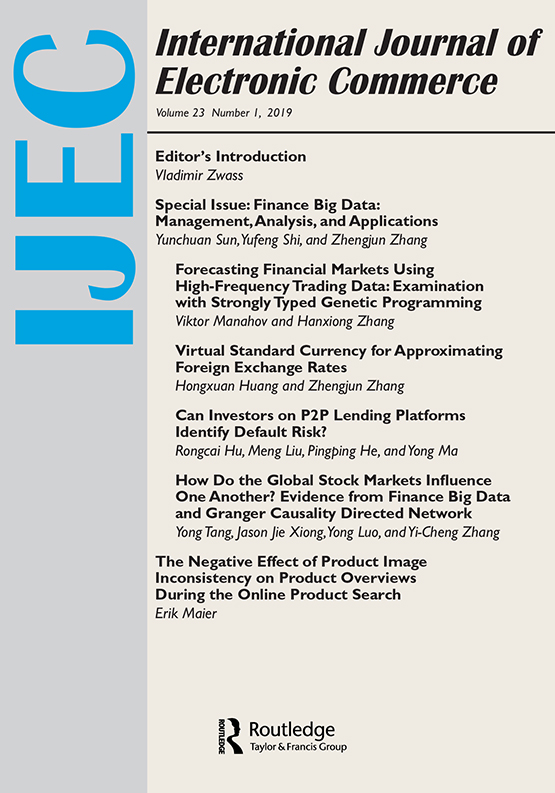在线零售商与线下零售商竞争的随机定价策略
IF 3.8
3区 管理学
Q2 BUSINESS
International Journal of Electronic Commerce
Pub Date : 2023-04-03
DOI:10.1080/10864415.2023.2184239
引用次数: 1
摘要
网上商业已经成为零售业的重要组成部分,与传统的线下零售商产生了激烈的竞争。鉴于在线零售渠道的不断增长,我们为在线零售商设计了随机定价策略,因为线下零售商的价格在无限期内保持不变。本研究比较了两家竞争零售商在两种不同情况下的定价策略、利润、消费者剩余和社会福利——一种情况下,在线零售商将实施随机定价策略,另一种情况下,它不会。传统观点认为,在线零售商在提供在线促销方面具有更大的灵活性,可以吸引更多的消费者以更低的价格在线购买,从而对线下零售商的利润产生负面影响。我们的模型表明,随机定价对线下零售商和社会福利也有好处,但对消费者剩余没有好处。我们还讨论了消费者的战略行为如何影响零售商的定价策略和利润。有人建议,在线零售商在制定促销概率时不应考虑线下交易成本。最后,我们考虑了线下零售商可以调整其策略的情况。价格匹配政策可以帮助线下零售商显著增加利润,但当消费者非常耐心且效用折扣系数足够小时,也可以使在线零售商受益。只有当离线交易成本足够高时,离线零售商才能从添加在线商店中获益。本文章由计算机程序翻译,如有差异,请以英文原文为准。
The Online Retailer’s Randomized Pricing Strategy to Compete With an Offline Retailer
ABSTRACT Online businesses have become an important sector of the retail industry, generating fierce competition with traditional offline retailers. In light of the growing online retail channels, we have designed a randomized pricing strategy for the online retailer, as the offline retailer’s price remains unchanged over an infinite period. This study compares two competing retailers’ pricing strategies, profits, consumer surplus, and social welfare, in two different scenarios—one in which the online retailer will implement a randomized pricing strategy, and one in which it will not. Conventional wisdom holds that online retailers possess greater flexibility when it comes to offering online promotions that attract more consumers to buy online at lower prices, negatively impacting offline retailers’ profits. Our model suggests that the randomized pricing can also benefit offline retailers and social welfare, but not consumer surplus. We also discuss how consumers’ strategic behavior affects retailers’ pricing strategies and profits. It has been suggested that online retailers should not consider offline transaction costs when formulating promotion probabilities. Finally, we consider cases in which an offline retailer can adjust its strategy. A price-matching policy can help the offline retailer significantly increase profits, but can also benefit the online retailer when consumers are very patient and the utility discount factor is sufficiently small. An offline retailer can benefit from adding an online store only when the offline transaction costs are sufficiently high.
求助全文
通过发布文献求助,成功后即可免费获取论文全文。
去求助
来源期刊

International Journal of Electronic Commerce
工程技术-计算机:软件工程
CiteScore
7.20
自引率
16.00%
发文量
18
审稿时长
>12 weeks
期刊介绍:
The International Journal of Electronic Commerce is the leading refereed quarterly devoted to advancing the understanding and practice of electronic commerce. It serves the needs of researchers as well as practitioners and executives involved in electronic commerce. The Journal aims to offer an integrated view of the field by presenting approaches of multiple disciplines.
Electronic commerce is the sharing of business information, maintaining business relationships, and conducting business transactions by digital means over telecommunications networks. The Journal accepts empirical and interpretive submissions that make a significant novel contribution to this field.
 求助内容:
求助内容: 应助结果提醒方式:
应助结果提醒方式:


